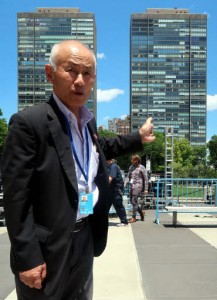Reporter’s View: Growing distrust of Japan over decision not to participate in U.N. talks
Jul. 21, 2017
by Kyosuke Mizukawa, Staff Writer
“A-bomb survivors and other citizens have flown from Japan, which took more than 10 hours, but the representatives of the government, even though they could walk here, aren’t attending the treaty talks,” said Toshiyuki Mimaki, deploring the government’s stance. Mr. Mimaki, 75, is the vice chair of the Hiroshima Prefectural Confederation of A-bomb Sufferers Organizations, which is chaired by Sunao Tsuboi. Last month, while the negotiations to establish a treaty to ban nuclear weapons were being held at U.N. headquarters in New York, Mr. Mimaki and I were looking at a building to the north of the U.N. This building houses the Japanese Mission to the U.N.
Apparently, Japanese officials watched the negotiations via the Internet. I heard that they had asked some participants from other nations to share information after the talks ended. When a member of an NGO said coldly, “Then why didn’t they join the negotiations?”, I couldn’t help but agree.
In fact, the Netherlands was the only member of the North Atlantic Treaty Organization (NATO) to take part in the negotiations. Like Japan, NATO members rely on the U.S. nuclear umbrella for their security. Though the Netherlands voted against the treaty, its attitude was still praised by Setsuko Thurlow, 85, an A-bomb survivor who lives in Toronto, Canada. “It was heartening that the Netherlands attended the talks and tried to understand,” said Ms. Thurlow. She added, “In contrast, the Japanese government’s attitude has created growing distrust among us. How can it possibly serve as a bridge between the nuclear and non-nuclear nations?”
The government says that it will rebuild relationships of trust between the nuclear and non-nuclear states to realize a world without nuclear weapons. But how can it manage that when it is no longer trusted by A-bomb survivors or the people of other countries?
The Nuclear Weapons Ban Treaty was adopted with the support of 122 nations. It refers to “hibakusha” in its preamble and bans the use or the threat of using nuclear weapons or other nuclear explosive devices under any circumstances. Growing distrust of the A-bombed nation can be interpreted as a reflection of people’s high hopes that Japan would play a leading role in pursuing a security framework that does not depend on nuclear arms. In this 72nd summer since the atomic bombings, the government’s actions will be severely scrutinized by the people of Hiroshima.
(Originally published on July 21, 2017)
“A-bomb survivors and other citizens have flown from Japan, which took more than 10 hours, but the representatives of the government, even though they could walk here, aren’t attending the treaty talks,” said Toshiyuki Mimaki, deploring the government’s stance. Mr. Mimaki, 75, is the vice chair of the Hiroshima Prefectural Confederation of A-bomb Sufferers Organizations, which is chaired by Sunao Tsuboi. Last month, while the negotiations to establish a treaty to ban nuclear weapons were being held at U.N. headquarters in New York, Mr. Mimaki and I were looking at a building to the north of the U.N. This building houses the Japanese Mission to the U.N.
Apparently, Japanese officials watched the negotiations via the Internet. I heard that they had asked some participants from other nations to share information after the talks ended. When a member of an NGO said coldly, “Then why didn’t they join the negotiations?”, I couldn’t help but agree.
In fact, the Netherlands was the only member of the North Atlantic Treaty Organization (NATO) to take part in the negotiations. Like Japan, NATO members rely on the U.S. nuclear umbrella for their security. Though the Netherlands voted against the treaty, its attitude was still praised by Setsuko Thurlow, 85, an A-bomb survivor who lives in Toronto, Canada. “It was heartening that the Netherlands attended the talks and tried to understand,” said Ms. Thurlow. She added, “In contrast, the Japanese government’s attitude has created growing distrust among us. How can it possibly serve as a bridge between the nuclear and non-nuclear nations?”
The government says that it will rebuild relationships of trust between the nuclear and non-nuclear states to realize a world without nuclear weapons. But how can it manage that when it is no longer trusted by A-bomb survivors or the people of other countries?
The Nuclear Weapons Ban Treaty was adopted with the support of 122 nations. It refers to “hibakusha” in its preamble and bans the use or the threat of using nuclear weapons or other nuclear explosive devices under any circumstances. Growing distrust of the A-bombed nation can be interpreted as a reflection of people’s high hopes that Japan would play a leading role in pursuing a security framework that does not depend on nuclear arms. In this 72nd summer since the atomic bombings, the government’s actions will be severely scrutinized by the people of Hiroshima.
(Originally published on July 21, 2017)








